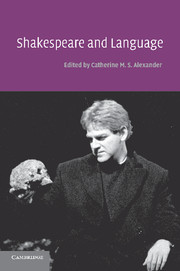Book contents
- Frontmatter
- Contents
- List of contributors
- Editor's note
- 1 Shakespeare and language: an introduction
- 2 Shakespeare's language and the language of Shakespeare's time
- 3 The foundations of Elizabethan language
- 4 Shakespeare's talking animals
- 5 Some functions of Shakespearian word-formation
- 6 Shakespeare and the tune of the time
- 7 Shakespeare's Romeo and Juliet: the places of invention
- 8 Shakespeare's thematic modes of speech: Richard II to Henry V
- 9 Hamlet and the power of words
- 10 The art of the comic duologue in three plays by Shakespeare
- 11 Hamlet's ear
- 12 ‘Voice potential’: language and symbolic capital in Othello
- 13 The aesthetics of mutilation in Titus Andronicus
- 14 ‘Time for such a word’: verbal echoing in Macbeth
- 15 Household words: Macbeth and the failure of spectacle
- 16 Late Shakespeare: style and the sexes
- Index
4 - Shakespeare's talking animals
Published online by Cambridge University Press: 15 December 2009
- Frontmatter
- Contents
- List of contributors
- Editor's note
- 1 Shakespeare and language: an introduction
- 2 Shakespeare's language and the language of Shakespeare's time
- 3 The foundations of Elizabethan language
- 4 Shakespeare's talking animals
- 5 Some functions of Shakespearian word-formation
- 6 Shakespeare and the tune of the time
- 7 Shakespeare's Romeo and Juliet: the places of invention
- 8 Shakespeare's thematic modes of speech: Richard II to Henry V
- 9 Hamlet and the power of words
- 10 The art of the comic duologue in three plays by Shakespeare
- 11 Hamlet's ear
- 12 ‘Voice potential’: language and symbolic capital in Othello
- 13 The aesthetics of mutilation in Titus Andronicus
- 14 ‘Time for such a word’: verbal echoing in Macbeth
- 15 Household words: Macbeth and the failure of spectacle
- 16 Late Shakespeare: style and the sexes
- Index
Summary
There is a tense moment at the end of certain modern dramatic productions (it is a feature which has recently shown itself at Stratford) when the actors suddenly turn on the audience and, in the name of communication, begin menacingly to advance on them with ferocious and implacable bonhomie. But let me put you out of fear. As this conference draws to an end, it is not my intention to come smilingly amongst you in any physical sense. I know my place. Nor does the title of my paper make mocking reference to any here present in their professional capacities. Dog does not eat dog.
But my subject does involve our communication with each other in a different, more general, but no less ‘contemporary’ way. For when Ben Jonson nominated language as ‘the only benefit man hath to expresse his excellencie of mind above other creatures’ (Timber, or Discoveries), he was articulating an idea that has had modernity thrust upon it. In fact the concept of man as the Talking Animal, with language his distinctive feature, marking him off from the other animals, is one of those currently fashionable notions redeemed, we might now profitably allow, by its antiquity. For the classification of man as zoon logon echon (a living creature possessing speech) enjoyed currency before Aristotle, and Cicero offers a formula no less positive than Ben Jonson's when he claims that ‘it is in this alone, or in this especially, that we are superior to the animals; that we can converse amongst ourselves, and express our thoughts in speech’ (De Oratore 1.8.32).
- Type
- Chapter
- Information
- Shakespeare and Language , pp. 68 - 78Publisher: Cambridge University PressPrint publication year: 2004

